International Business Report: Cultural Policies and Expansion
VerifiedAdded on 2022/11/30
|8
|1384
|357
Report
AI Summary
This report delves into the complexities of international business, focusing on cultural impacts and strategies within a global context, using Deutsche Bank as a primary example. The introduction highlights the importance of international business for organizational growth and the significance of understanding cultural barriers in areas such as work environment, training, and customer satisfaction. The main body explores key concepts including high and low context cultures, the EPRG framework (ethnocentric, polycentric, regiocentric, and geocentric orientations), and Handy's model of organizational culture (power, person, and task cultures). The report analyzes how Deutsche Bank navigates these cultural aspects in its global operations, emphasizing the impact of cultural differences on productivity and decision-making. The conclusion reiterates the crucial role of cultural understanding in international business success, emphasizing the need for organizations to adapt to diverse norms and values for effective global expansion. References include various books and journals that support the research and analysis presented in the report.
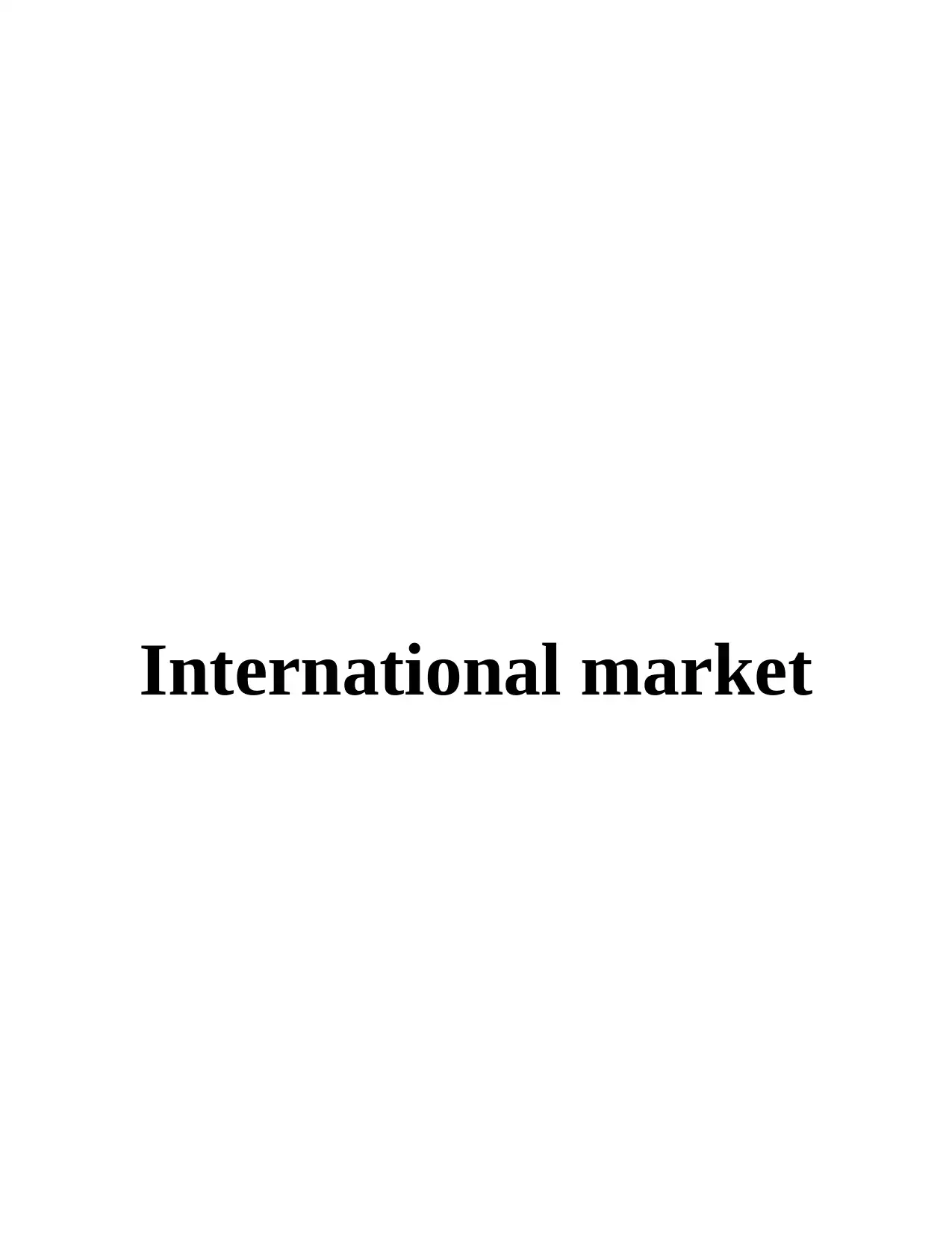
International market
Paraphrase This Document
Need a fresh take? Get an instant paraphrase of this document with our AI Paraphraser

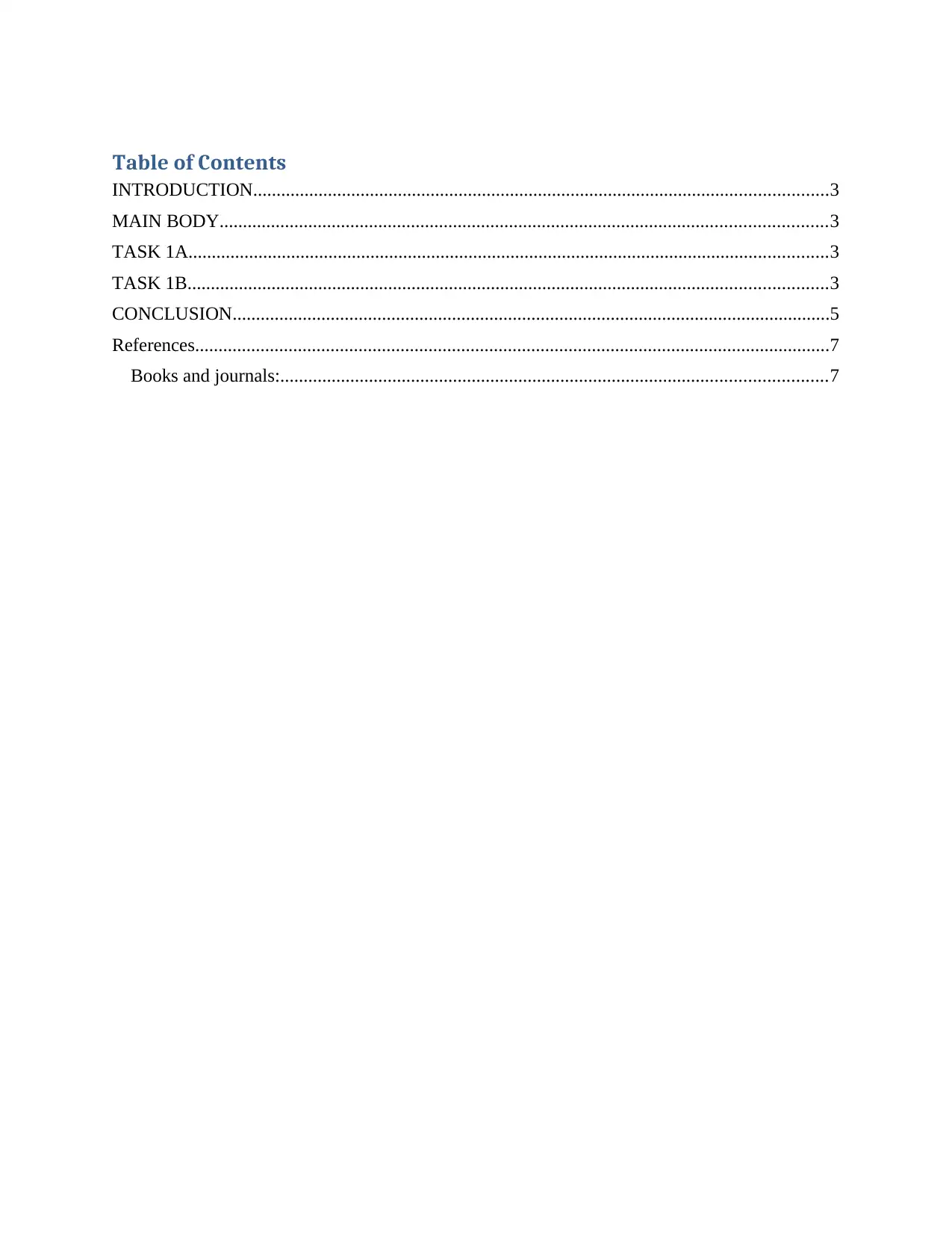
Table of Contents
INTRODUCTION...........................................................................................................................3
MAIN BODY..................................................................................................................................3
TASK 1A.........................................................................................................................................3
TASK 1B.........................................................................................................................................3
CONCLUSION................................................................................................................................5
References........................................................................................................................................7
Books and journals:.....................................................................................................................7
INTRODUCTION...........................................................................................................................3
MAIN BODY..................................................................................................................................3
TASK 1A.........................................................................................................................................3
TASK 1B.........................................................................................................................................3
CONCLUSION................................................................................................................................5
References........................................................................................................................................7
Books and journals:.....................................................................................................................7
⊘ This is a preview!⊘
Do you want full access?
Subscribe today to unlock all pages.

Trusted by 1+ million students worldwide
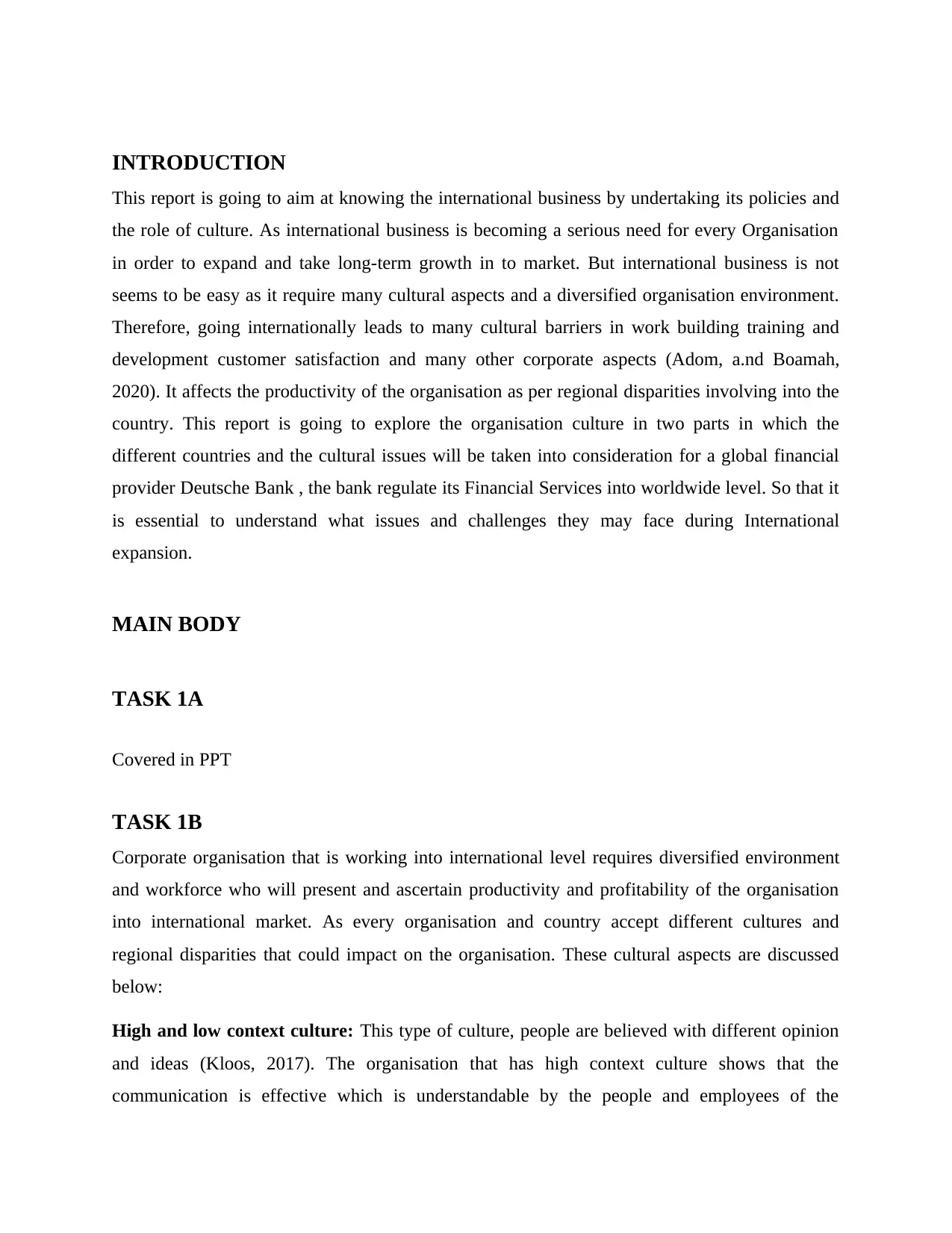
INTRODUCTION
This report is going to aim at knowing the international business by undertaking its policies and
the role of culture. As international business is becoming a serious need for every Organisation
in order to expand and take long-term growth in to market. But international business is not
seems to be easy as it require many cultural aspects and a diversified organisation environment.
Therefore, going internationally leads to many cultural barriers in work building training and
development customer satisfaction and many other corporate aspects (Adom, a.nd Boamah,
2020). It affects the productivity of the organisation as per regional disparities involving into the
country. This report is going to explore the organisation culture in two parts in which the
different countries and the cultural issues will be taken into consideration for a global financial
provider Deutsche Bank , the bank regulate its Financial Services into worldwide level. So that it
is essential to understand what issues and challenges they may face during International
expansion.
MAIN BODY
TASK 1A
Covered in PPT
TASK 1B
Corporate organisation that is working into international level requires diversified environment
and workforce who will present and ascertain productivity and profitability of the organisation
into international market. As every organisation and country accept different cultures and
regional disparities that could impact on the organisation. These cultural aspects are discussed
below:
High and low context culture: This type of culture, people are believed with different opinion
and ideas (Kloos, 2017). The organisation that has high context culture shows that the
communication is effective which is understandable by the people and employees of the
This report is going to aim at knowing the international business by undertaking its policies and
the role of culture. As international business is becoming a serious need for every Organisation
in order to expand and take long-term growth in to market. But international business is not
seems to be easy as it require many cultural aspects and a diversified organisation environment.
Therefore, going internationally leads to many cultural barriers in work building training and
development customer satisfaction and many other corporate aspects (Adom, a.nd Boamah,
2020). It affects the productivity of the organisation as per regional disparities involving into the
country. This report is going to explore the organisation culture in two parts in which the
different countries and the cultural issues will be taken into consideration for a global financial
provider Deutsche Bank , the bank regulate its Financial Services into worldwide level. So that it
is essential to understand what issues and challenges they may face during International
expansion.
MAIN BODY
TASK 1A
Covered in PPT
TASK 1B
Corporate organisation that is working into international level requires diversified environment
and workforce who will present and ascertain productivity and profitability of the organisation
into international market. As every organisation and country accept different cultures and
regional disparities that could impact on the organisation. These cultural aspects are discussed
below:
High and low context culture: This type of culture, people are believed with different opinion
and ideas (Kloos, 2017). The organisation that has high context culture shows that the
communication is effective which is understandable by the people and employees of the
Paraphrase This Document
Need a fresh take? Get an instant paraphrase of this document with our AI Paraphraser
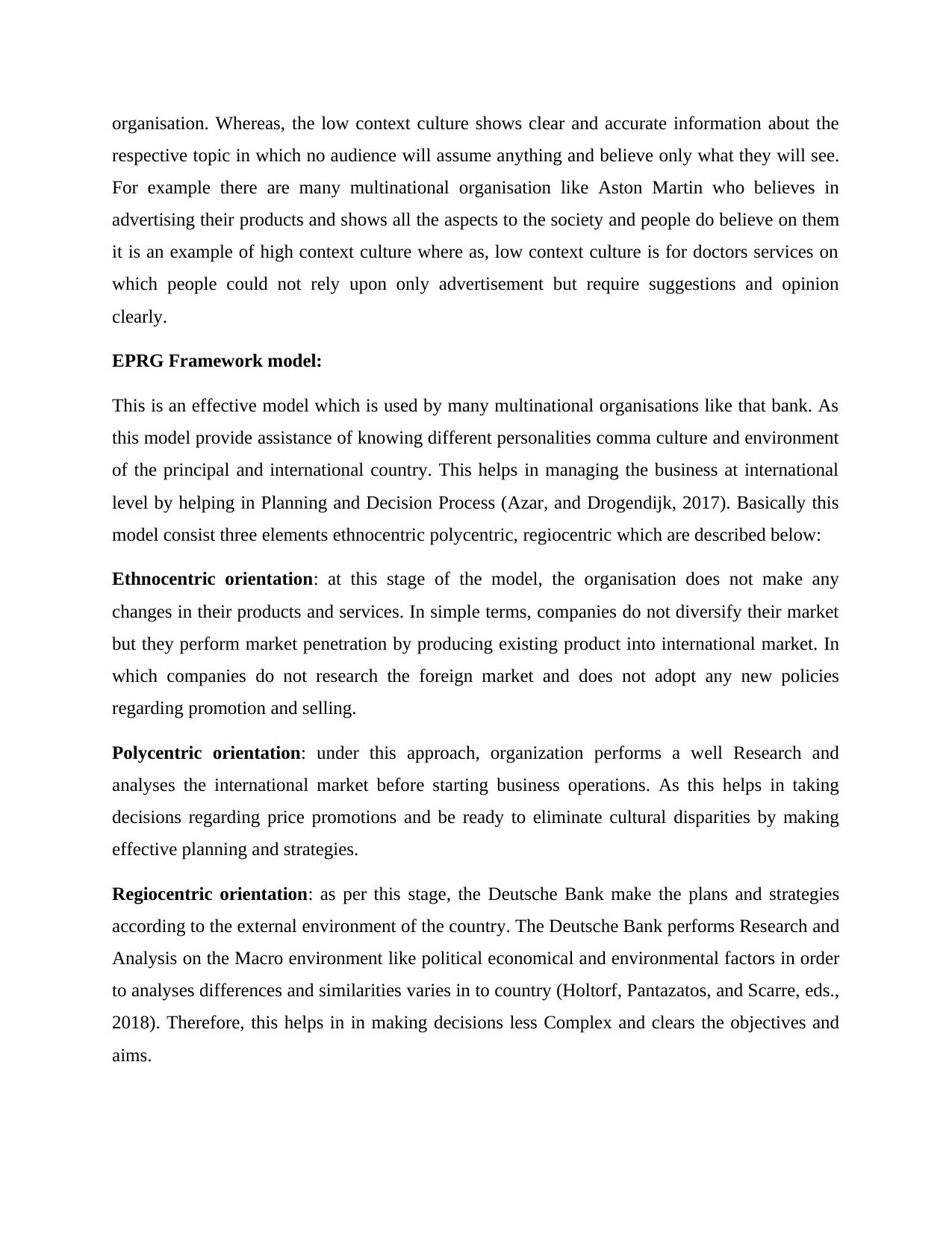
organisation. Whereas, the low context culture shows clear and accurate information about the
respective topic in which no audience will assume anything and believe only what they will see.
For example there are many multinational organisation like Aston Martin who believes in
advertising their products and shows all the aspects to the society and people do believe on them
it is an example of high context culture where as, low context culture is for doctors services on
which people could not rely upon only advertisement but require suggestions and opinion
clearly.
EPRG Framework model:
This is an effective model which is used by many multinational organisations like that bank. As
this model provide assistance of knowing different personalities comma culture and environment
of the principal and international country. This helps in managing the business at international
level by helping in Planning and Decision Process (Azar, and Drogendijk, 2017). Basically this
model consist three elements ethnocentric polycentric, regiocentric which are described below:
Ethnocentric orientation: at this stage of the model, the organisation does not make any
changes in their products and services. In simple terms, companies do not diversify their market
but they perform market penetration by producing existing product into international market. In
which companies do not research the foreign market and does not adopt any new policies
regarding promotion and selling.
Polycentric orientation: under this approach, organization performs a well Research and
analyses the international market before starting business operations. As this helps in taking
decisions regarding price promotions and be ready to eliminate cultural disparities by making
effective planning and strategies.
Regiocentric orientation: as per this stage, the Deutsche Bank make the plans and strategies
according to the external environment of the country. The Deutsche Bank performs Research and
Analysis on the Macro environment like political economical and environmental factors in order
to analyses differences and similarities varies in to country (Holtorf, Pantazatos, and Scarre, eds.,
2018). Therefore, this helps in in making decisions less Complex and clears the objectives and
aims.
respective topic in which no audience will assume anything and believe only what they will see.
For example there are many multinational organisation like Aston Martin who believes in
advertising their products and shows all the aspects to the society and people do believe on them
it is an example of high context culture where as, low context culture is for doctors services on
which people could not rely upon only advertisement but require suggestions and opinion
clearly.
EPRG Framework model:
This is an effective model which is used by many multinational organisations like that bank. As
this model provide assistance of knowing different personalities comma culture and environment
of the principal and international country. This helps in managing the business at international
level by helping in Planning and Decision Process (Azar, and Drogendijk, 2017). Basically this
model consist three elements ethnocentric polycentric, regiocentric which are described below:
Ethnocentric orientation: at this stage of the model, the organisation does not make any
changes in their products and services. In simple terms, companies do not diversify their market
but they perform market penetration by producing existing product into international market. In
which companies do not research the foreign market and does not adopt any new policies
regarding promotion and selling.
Polycentric orientation: under this approach, organization performs a well Research and
analyses the international market before starting business operations. As this helps in taking
decisions regarding price promotions and be ready to eliminate cultural disparities by making
effective planning and strategies.
Regiocentric orientation: as per this stage, the Deutsche Bank make the plans and strategies
according to the external environment of the country. The Deutsche Bank performs Research and
Analysis on the Macro environment like political economical and environmental factors in order
to analyses differences and similarities varies in to country (Holtorf, Pantazatos, and Scarre, eds.,
2018). Therefore, this helps in in making decisions less Complex and clears the objectives and
aims.
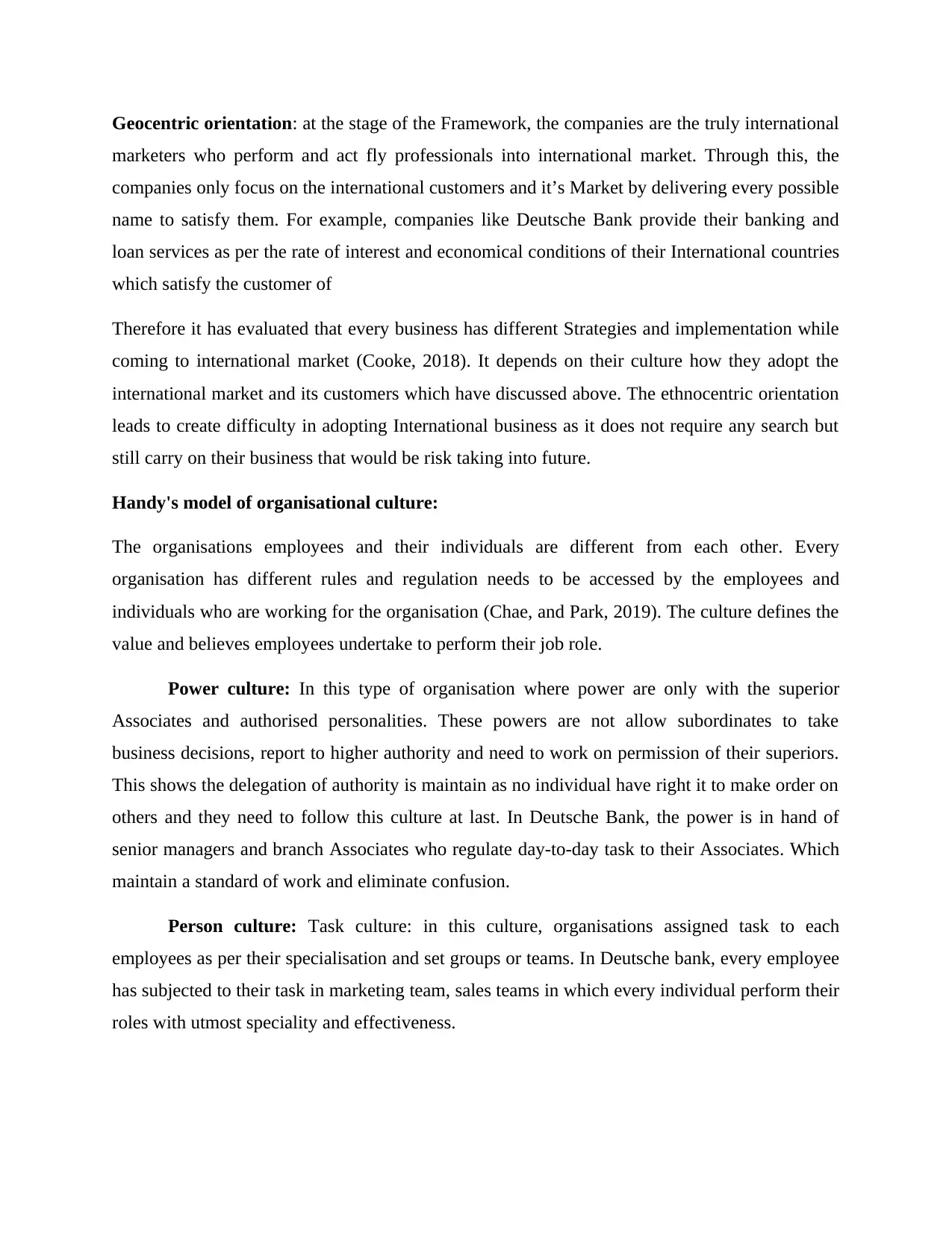
Geocentric orientation: at the stage of the Framework, the companies are the truly international
marketers who perform and act fly professionals into international market. Through this, the
companies only focus on the international customers and it’s Market by delivering every possible
name to satisfy them. For example, companies like Deutsche Bank provide their banking and
loan services as per the rate of interest and economical conditions of their International countries
which satisfy the customer of
Therefore it has evaluated that every business has different Strategies and implementation while
coming to international market (Cooke, 2018). It depends on their culture how they adopt the
international market and its customers which have discussed above. The ethnocentric orientation
leads to create difficulty in adopting International business as it does not require any search but
still carry on their business that would be risk taking into future.
Handy's model of organisational culture:
The organisations employees and their individuals are different from each other. Every
organisation has different rules and regulation needs to be accessed by the employees and
individuals who are working for the organisation (Chae, and Park, 2019). The culture defines the
value and believes employees undertake to perform their job role.
Power culture: In this type of organisation where power are only with the superior
Associates and authorised personalities. These powers are not allow subordinates to take
business decisions, report to higher authority and need to work on permission of their superiors.
This shows the delegation of authority is maintain as no individual have right it to make order on
others and they need to follow this culture at last. In Deutsche Bank, the power is in hand of
senior managers and branch Associates who regulate day-to-day task to their Associates. Which
maintain a standard of work and eliminate confusion.
Person culture: Task culture: in this culture, organisations assigned task to each
employees as per their specialisation and set groups or teams. In Deutsche bank, every employee
has subjected to their task in marketing team, sales teams in which every individual perform their
roles with utmost speciality and effectiveness.
marketers who perform and act fly professionals into international market. Through this, the
companies only focus on the international customers and it’s Market by delivering every possible
name to satisfy them. For example, companies like Deutsche Bank provide their banking and
loan services as per the rate of interest and economical conditions of their International countries
which satisfy the customer of
Therefore it has evaluated that every business has different Strategies and implementation while
coming to international market (Cooke, 2018). It depends on their culture how they adopt the
international market and its customers which have discussed above. The ethnocentric orientation
leads to create difficulty in adopting International business as it does not require any search but
still carry on their business that would be risk taking into future.
Handy's model of organisational culture:
The organisations employees and their individuals are different from each other. Every
organisation has different rules and regulation needs to be accessed by the employees and
individuals who are working for the organisation (Chae, and Park, 2019). The culture defines the
value and believes employees undertake to perform their job role.
Power culture: In this type of organisation where power are only with the superior
Associates and authorised personalities. These powers are not allow subordinates to take
business decisions, report to higher authority and need to work on permission of their superiors.
This shows the delegation of authority is maintain as no individual have right it to make order on
others and they need to follow this culture at last. In Deutsche Bank, the power is in hand of
senior managers and branch Associates who regulate day-to-day task to their Associates. Which
maintain a standard of work and eliminate confusion.
Person culture: Task culture: in this culture, organisations assigned task to each
employees as per their specialisation and set groups or teams. In Deutsche bank, every employee
has subjected to their task in marketing team, sales teams in which every individual perform their
roles with utmost speciality and effectiveness.
⊘ This is a preview!⊘
Do you want full access?
Subscribe today to unlock all pages.

Trusted by 1+ million students worldwide
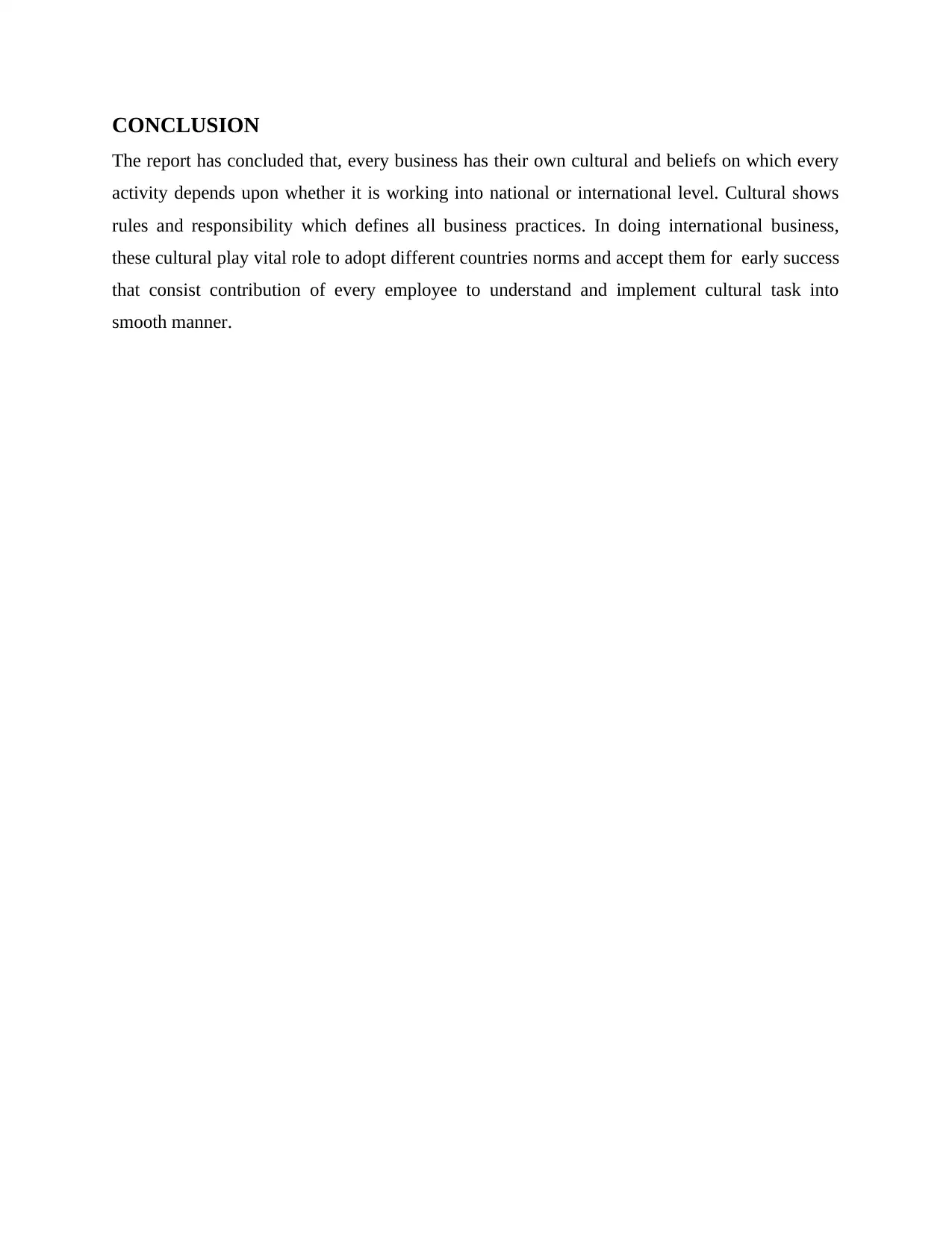
CONCLUSION
The report has concluded that, every business has their own cultural and beliefs on which every
activity depends upon whether it is working into national or international level. Cultural shows
rules and responsibility which defines all business practices. In doing international business,
these cultural play vital role to adopt different countries norms and accept them for early success
that consist contribution of every employee to understand and implement cultural task into
smooth manner.
The report has concluded that, every business has their own cultural and beliefs on which every
activity depends upon whether it is working into national or international level. Cultural shows
rules and responsibility which defines all business practices. In doing international business,
these cultural play vital role to adopt different countries norms and accept them for early success
that consist contribution of every employee to understand and implement cultural task into
smooth manner.
Paraphrase This Document
Need a fresh take? Get an instant paraphrase of this document with our AI Paraphraser
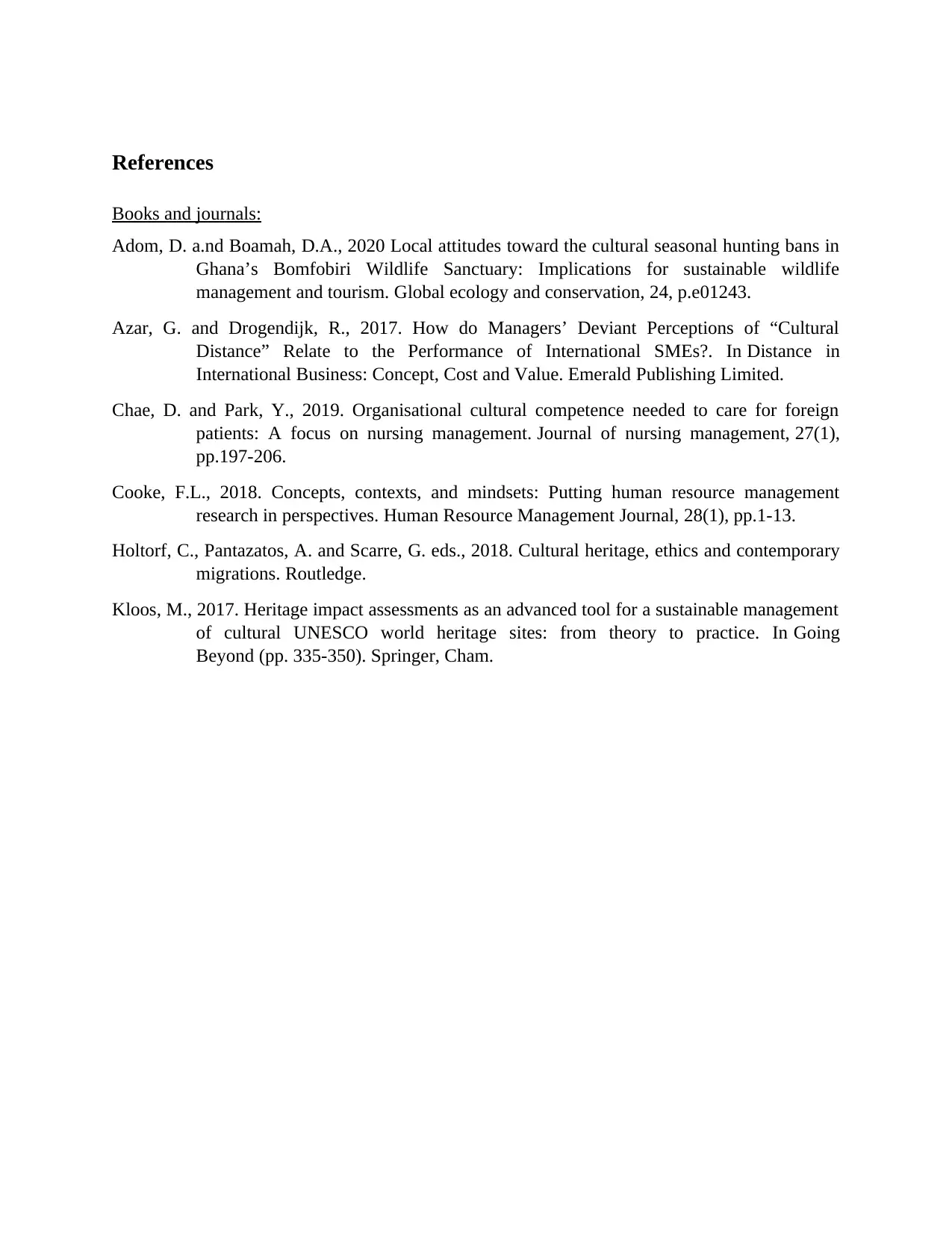
References
Books and journals:
Adom, D. a.nd Boamah, D.A., 2020 Local attitudes toward the cultural seasonal hunting bans in
Ghana’s Bomfobiri Wildlife Sanctuary: Implications for sustainable wildlife
management and tourism. Global ecology and conservation, 24, p.e01243.
Azar, G. and Drogendijk, R., 2017. How do Managers’ Deviant Perceptions of “Cultural
Distance” Relate to the Performance of International SMEs?. In Distance in
International Business: Concept, Cost and Value. Emerald Publishing Limited.
Chae, D. and Park, Y., 2019. Organisational cultural competence needed to care for foreign
patients: A focus on nursing management. Journal of nursing management, 27(1),
pp.197-206.
Cooke, F.L., 2018. Concepts, contexts, and mindsets: Putting human resource management
research in perspectives. Human Resource Management Journal, 28(1), pp.1-13.
Holtorf, C., Pantazatos, A. and Scarre, G. eds., 2018. Cultural heritage, ethics and contemporary
migrations. Routledge.
Kloos, M., 2017. Heritage impact assessments as an advanced tool for a sustainable management
of cultural UNESCO world heritage sites: from theory to practice. In Going
Beyond (pp. 335-350). Springer, Cham.
Books and journals:
Adom, D. a.nd Boamah, D.A., 2020 Local attitudes toward the cultural seasonal hunting bans in
Ghana’s Bomfobiri Wildlife Sanctuary: Implications for sustainable wildlife
management and tourism. Global ecology and conservation, 24, p.e01243.
Azar, G. and Drogendijk, R., 2017. How do Managers’ Deviant Perceptions of “Cultural
Distance” Relate to the Performance of International SMEs?. In Distance in
International Business: Concept, Cost and Value. Emerald Publishing Limited.
Chae, D. and Park, Y., 2019. Organisational cultural competence needed to care for foreign
patients: A focus on nursing management. Journal of nursing management, 27(1),
pp.197-206.
Cooke, F.L., 2018. Concepts, contexts, and mindsets: Putting human resource management
research in perspectives. Human Resource Management Journal, 28(1), pp.1-13.
Holtorf, C., Pantazatos, A. and Scarre, G. eds., 2018. Cultural heritage, ethics and contemporary
migrations. Routledge.
Kloos, M., 2017. Heritage impact assessments as an advanced tool for a sustainable management
of cultural UNESCO world heritage sites: from theory to practice. In Going
Beyond (pp. 335-350). Springer, Cham.
1 out of 8
Related Documents
Your All-in-One AI-Powered Toolkit for Academic Success.
+13062052269
info@desklib.com
Available 24*7 on WhatsApp / Email
![[object Object]](/_next/static/media/star-bottom.7253800d.svg)
Unlock your academic potential
Copyright © 2020–2026 A2Z Services. All Rights Reserved. Developed and managed by ZUCOL.




